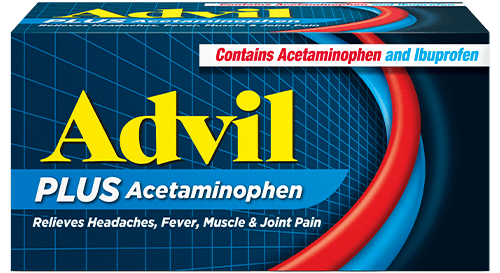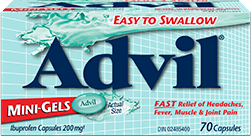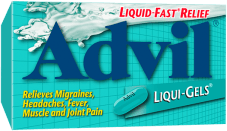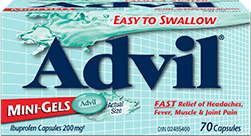Common Types of Headaches and What Causes Them
Understand the different types of headaches and what causes them

Headaches are never a pleasant experience, and often they seem to come out of nowhere. For many, the first instinct may be to take a pain reliever, as it can help reduce whatever headache you may be experiencing. Sometimes you might only need to rest or simply hydrate to get rid of your headache. In this article, we discuss three common headaches, some common causes of headaches, and the ways in which you can help relieve your symptoms.
1. Tension Headaches
One of the most common headaches people experience are tension headaches.i One of the best indicators that you may be experiencing a tension headache is if you’re feeling a squeezing pain on either side of the head.ii Causes of tension headaches can be linked to many things, such as extreme fatigue and emotional stress, or when people hold a considerable amount of tension in their neck or jaw.iii For those that get occasional tension-type headaches, an over-the-counter pain reliever such Advil® Liquid Gels® can help you take care of the pain.iv Home remedies such as a long, warm shower, a heating pad, or short nap can also help provide you with relief from the headache.v
2. Migraines
Migraines can cause more severe pain than tension headaches. Many neurologists agree that a migraine is caused when the brain’s blood flow is changed significantly.vi It is common for someone who has a migraine to have neurological symptoms called an aura.vii The aura can cause tingling on the side of your face, as well as cause visual problems such as sparkles or flashing lights.viii
Common causes of migraines can include things like fatigue, a dramatic change in weather, and stress. Diet can also play a factor, including the amount of caffeine you consume, skipping a meal, drinking certain types of alcohol, and eating chocolate.ix Consider Advil® Extra Strength Liquid Gels® as an over-the-counter option to relieve your migraine pain. If your migraines persist, talk to your doctor about possible causes and treatment options.
3. Cluster Headaches
Another type of headache that’s less common, but still severe, is a cluster headache. This type of headache is properly named, as the headaches come and go in clusters. This means when you’re dealing with a cluster headache, you experience one to eight headaches a day over a few months.x Usually cluster headaches are concentrated on one side of the head and cause severe pain, watery eyes, and a runny nose.xi
Causes of cluster headaches are still relatively unknown. Cluster headaches are not known to be associated with certain foods, stress, and alcohol, however these factors can make a cluster headache worse.xiii
Though the onset of a headache can really cause a disruption to your day, it’s important not only to treat the headache, but to understand what’s causing it. Headache causes may vary from person to person, but keeping track of your stress levels, what foods you’re putting in your body, and how much sleep you’re getting could help you identify when your next headache might be.
For more information about headaches and migraines, go to the headaches and migraine sections on our website.
SOURCES:
- Headache: When to worry, what to do. https://www.health.harvard.edu/pain/headache-when-to-worry-what-to-do. Accessed on 7/16/2020. Referenced text is highlighted on page 2, paragraph 2 in source PDF.
- Headache: When to worry, what to do. https://www.health.harvard.edu/pain/headache-when-to-worry-what-to-do. Accessed on 7/16/2020. Referenced text is highlighted on page 2, paragraph 3 in source PDF.
- Headache: When to worry, what to do. https://www.health.harvard.edu/pain/headache-when-to-worry-what-to-do. Accessed on 7/16/2020. Referenced text is highlighted on page 2, paragraph 3 in source PDF.
- Headache: When to worry, what to do. https://www.health.harvard.edu/pain/headache-when-to-worry-what-to-do. Accessed on 7/16/2020. Referenced text is highlighted on page 2, paragraph 4 in source PDF.
- Headache: When to worry, what to do. https://www.health.harvard.edu/pain/headache-when-to-worry-what-to-do. Accessed on 7/16/2020. Referenced text is highlighted on page 2, paragraph 4 in source PDF.
- Headache: When to worry, what to do. https://www.health.harvard.edu/pain/headache-when-to-worry-what-to-do. Accessed on 7/16/2020. Referenced text is highlighted on page 3, paragraph 1 in source PDF.
- Headache: When to worry, what to do. https://www.health.harvard.edu/pain/headache-when-to-worry-what-to-do. Accessed on 7/16/2020. Referenced text is highlighted on page 3, paragraph 5 in source PDF.
- Headache: When to worry, what to do. https://www.health.harvard.edu/pain/headache-when-to-worry-what-to-do. Accessed on 7/16/2020. Referenced text is highlighted on page 3, paragraph 5 in source PDF.
- Headache: When to worry, what to do. https://www.health.harvard.edu/pain/headache-when-to-worry-what-to-do. Accessed on 7/16/2020. Referenced text is highlighted on page 3, paragraph 3 in source PDF.
- Headache: When to worry, what to do. https://www.health.harvard.edu/pain/headache-when-to-worry-what-to-do. Accessed on 7/16/2020. Referenced text is highlighted on page 3, paragraph 4 in source PDF.
- Headache: When to worry, what to do. https://www.health.harvard.edu/pain/headache-when-to-worry-what-to-do. Accessed on 7/16/2020. Referenced text is highlighted on page 3, paragraph 4 in source PDF.
- Cluster Headache. https://www.mayoclinic.org/diseases-conditions/cluster-headache/symptoms-causes/syc-20352080. Accessed on 7/16/2020. Referenced text is highlighted on page 3, paragraph 4 in source PDF.
- Cluster Headache. https://www.mayoclinic.org/diseases-conditions/cluster-headache/symptoms-causes/syc-20352080. Accessed on 7/16/2020. Referenced text is highlighted on page 3, paragraph 6 in source PDF.
Be sure this product is right for you. Always read and follow the directions on the label. This information is provided for educational purposes only and should not be used as a substitute for professional medical advice, diagnosis, or treatment. Speak to your healthcare professional before making any changes to your lifestyle or before beginning or discontinuing any course of treatment. Never disregard professional medical advice or delay in seeking it because of something you have read on this site.





